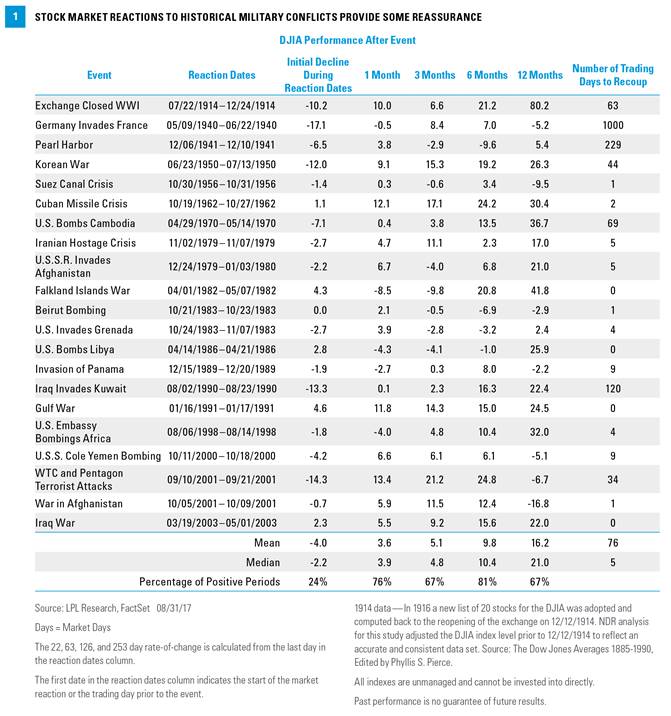KEY TAKEAWAYS
• Investors have understandably become increasingly concerned amid escalating North Korean threats.
• As scary as the threat may be, history suggests that stock market reactions to similar events have been short lived.
• While we are all hoping for a peaceful resolution, military conflicts do carry the potential to unify policymakers.
Investors have become increasingly concerned about the escalating North Korean threats, and understandably so. After initially shrugging off the risk, financial markets have shown increased concern over the past several weeks as the threats have become more direct (Guam) and the range of missile tests has increased (over Japan). In the latest development over the weekend, North Korea conducted its largest nuclear test and claims to have a hydrogen bomb capable of being delivered on a long-range missile. While the future of this conflict is very much uncertain, and we are sympathetic to the potential human impact of military engagement, from a market perspective, a look back at past geopolitical and military events offers a reassuring view.
In mid-August we recommended taking some risk off the table, due in part to geopolitical uncertainty; other considerations included seasonal factors, a lack of clear near-term positive catalysts, policy risks in Washington, D.C., the stock market’s strong 2017, and near historically low volatility.
Historical Market Perspective
Although responses to growing nuclear capacity are more limited in number (thankfully), we do have many historical military conflicts to consider for a sense of how stocks might react. Regardless of the circumstances, looking at history to find similar conditions or events can be helpful.
With help from our friends at Ned Davis Research, we compiled a list of notable military events dating back to World War I and then looked at how stocks performed after these events [Figure 1]. The market performance appears encouraging—stocks tended to react negatively on the days that the events occurred, with an average drop of about 4%; but afterwards, stocks displayed impressive resilience. Over the subsequent one-, three-, six-, and twelve-month periods, stocks have produced solid gains, on average, with gains in over 60% of the periods included. But perhaps most impressive is that the Dow Industrials were higher six months after these events 81% of the 21 occurrences, with an average gain of 10%; and over the subsequent year, stocks rose 16% on average.
Also noteworthy is how fast stocks have recouped those initial losses. In most instances, the Dow Jones Industrials Average has returned to pre-event levels within a couple of weeks or less. The primary reason why stocks have been able to shrug off most of these events, and why we think stocks may behave similarly in response to the North Korean threat, is that historically speaking, these conflicts tend not to disrupt the business cycle, which is the single most important factor in the path of stock prices over time.

More Defense Spending
We expect defense spending to rise as a result of heightened tensions with North Korea, though the trajectory had already been pointing higher since the November election. The North Atlantic Treaty Organization’s (NATO) 2% of gross domestic product defense spending targets and President Trump’s calls for other countries to increase spending have put some upward pressure on global defense spending this year. According to NATO, defense spending among European members and Canada is expected to increase more than 4% in 2017. In addition, as tensions with North Korea escalate, the odds of a preventative strike from the U.S., while still low, rise, and the need for stronger missile defense capabilities increases, pushing the defense spending trajectory even higher for the U.S. and our Asian allies. As a result, defense stocks may get a boost.
Unity In Washington?
Military conflicts, as unwelcomed as they may be, do bring the potential to create unity in the country and among policymakers in Washington, D.C. While it is very difficult to envision much bipartisan agreement in the current political environment, the latest U.S. security threat may make reaching a 2018 federal budget agreement easier. Defending the country from an immediate threat is something policymakers and most of their constituents on both sides can generally agree on. The devastation of Hurricane Harvey can have a similar impact, as we touch on in today’s Weekly Economic Commentary.
Conclusion
A nuclear-armed North Korea is undoubtedly a scary proposition. While we hope for peaceful resolution, which we currently view as likely, during periods of uncertainty, as investors we use history to help us navigate challenging investment landscapes. In the case of this worrisome threat from a stock market perspective, history does offer some reassurance. We acknowledge that geopolitical risk may contribute to heightened near-term stock market volatility, and are always watchful for developments that may warrant a change in our asset allocation. At this point in time, LPL Research does not foresee a prolonged military conflict or sustained stock market weakness that could end the current bull market.
Burt White is chief investment officer for LPL Financial.








